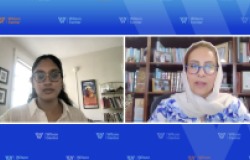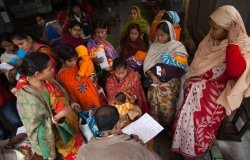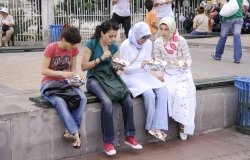Achieving Sexual and Reproductive Health and Rights for All
Join the Wilson Center’s Maternal Health Initiative and the Guttmacher Institute for a discussion on how policymakers, health practitioners, educators, and advocates can implement key recommendations put forth by the Guttmacher-Lancet Commission to achieve sexual and reproductive health and rights for all.
Overview
“The Guttmacher-Lancet Commission could not come at a better time,” said Patricia Da Silva, Associate Director of the International Planned Parenthood Federation United Nations Liaison Office. “It is indeed the call to action that is required; showing us that comprehensive sexual and reproductive rights must be ensured for all.” She spoke at a recent Wilson Center event on the work of the Guttmacher-Lancet Commission on Sexual and Reproductive Health and Rights (SRHR). The Commission, an international collaboration of 16 SRHR experts from Africa, Asia, Europe, the Middle East, and North and South America, recently published a report, Accelerate Progress—Sexual and Reproductive Health and Rights for All, which makes concrete recommendations for countries to address SRHR gaps and inequalities.
The New, More Comprehensive Definition of SRHR
The new definition of SRHR outlined in the Commission affirms that achieving sexual and reproductive health depends on realizing sexual and reproductive rights. This evidence-based report says sexual and reproductive health is central to a person’s overall health and well-being and not a narrow, isolated set of health issues. It also views health and rights as wholly interconnected and challenges governments to address both in order to achieve equitable and sustainable development.
The report outlines a package of essential sexual and reproductive health (SRH) interventions, which include the standard services relating to contraception, HIV prevention, and maternal and newborn health. The commission also highlights often neglected components of SRHR, such as safe abortion care, infertility treatment, LGBTQI-friendly services, comprehensive sexuality education, detection and counseling for gender-based violence, and reproductive cancers.
Beyond service provision, the commission emphasizes the importance of creating supportive environments to expand SRHR and asks governments to prioritize legal reform and combat harmful social and gender norms in order to facilitate access to care and normalize SRHR. “State-sponsored homophobia and transphobia” allow for punitive laws that discriminate against specific populations, said Felicity Daly, Honorary Research Fellow at the Australian Research Centre in Sex, Health, and Society at La Trobe University. Currently, laws criminalize HIV in 72 countries and laws outlaw same-sex relationships in at least 76 countries.
Blocked Access
According to the report, almost everyone of reproductive age—about 4.3 billion people—will not have access to at least one essential reproductive health intervention over the course of their lives. Globally, there is a long history of discrimination and mistreatment in healthcare settings that has fueled lack of access to essential services. “There’s still a very heteronormative domain in sexual and reproductive health service provision,” said Daly. Fear of disclosing personal information such as sexuality, gender identity, and HIV status to health providers prevents individuals from receiving adequate and appropriate sexual and reproductive health services. The right to be free of discrimination and coercion means vulnerable populations, such as youth, refugees, indigenous populations, people with disabilities, and LGBTQI individuals are entitled to access to quality care that is compassionate and dignified.
A global priority must be to acknowledge the impact of systemic oppression on SRHR and ensure that healthcare providers are trained to provide quality care that respects a patient’s human rights. Providers must know the unique health needs of their patient population and be able to provide accurate information and appropriate treatment. Preston Mitchum, Senior Legal and International Policy Analyst at Advocates for Youth, emphasized that working with diverse populations requires an understanding of “the intersection of what it means to be clinically competent and culturally competent.”
Reproductive Justice
Sexual and reproductive health rely on not only rights, but also reproductive justice, said Mitchum. SisterSong Women of Color Reproductive Justice Collective defines reproductive justice as “the human right to maintain personal bodily autonomy, have children, not have children, and parent the children we have in safe and sustainable communities.” Under this framework, all individuals have the right to make decisions regarding their own bodies, including family planning and sexuality.
In order to preserve reproductive justice and SRHR, countries must repeal harmful, discriminatory laws and enact protective ones to ensure continuity of progress across political administrations, said Dr. Mabel Bianco, President and Founder of the Foundation for Studies and Research on Women. This includes laws that allow women to access contraception and seek a safe abortion.
“Denying safe abortions is a violence,” said Bianco. Unsafe abortion is one of the leading causes of maternal mortality worldwide. Evidence shows that legal restrictions on abortions do not reduce the actual number of abortions. Instead they increase the risk that the same number of abortions will be unsafe. In fact, countries with the lowest rates of abortion have permissive abortion laws, high rates of contraceptive use, and quality SRH services. Bianco stressed the need for comprehensive sexuality education and contraception to prevent abortions and safe abortions to prevent needless deaths. Da Silva agreed, “Let’s get contraception into the hands of women that want to control their fertility, that want to plan their pregnancies. That would make a difference.”
Panelists agreed that the fight for reproductive justice expands beyond abortion. At the core of reproductive justice is the interconnection of health and human rights. As the Commission states, “to advance health, we must advance rights.”
Written by Elizabeth Wang and Sarah Barnes.
Moderator
Panelists
Dr. Mabel Bianco
Felicity Daly
Preston Mitchum
Hosted By

Maternal Health Initiative
Life and health are the most basic human rights, yet disparities between and within countries continue to grow. No single solution or institution can address the variety of health concerns the world faces. By leveraging, building on, and coordinating the Wilson Center’s strong regional and cross-cutting programming, the Maternal Health Initiative (MHI) promotes dialogue and understanding among practitioners, scholars, community leaders, and policymakers. Read more

Global Risk and Resilience Program
The Global Risk and Resilience Program (GRRP) seeks to support the development of inclusive, resilient networks in local communities facing global change. By providing a platform for sharing lessons, mapping knowledge, and linking people and ideas, GRRP and its affiliated programs empower policymakers, practitioners, and community members to participate in the global dialogue on sustainability and resilience. Empowered communities are better able to develop flexible, diverse, and equitable networks of resilience that can improve their health, preserve their natural resources, and build peace between people in a changing world. Read more
Thank you for your interest in this event. Please send any feedback or questions to our Events staff.









